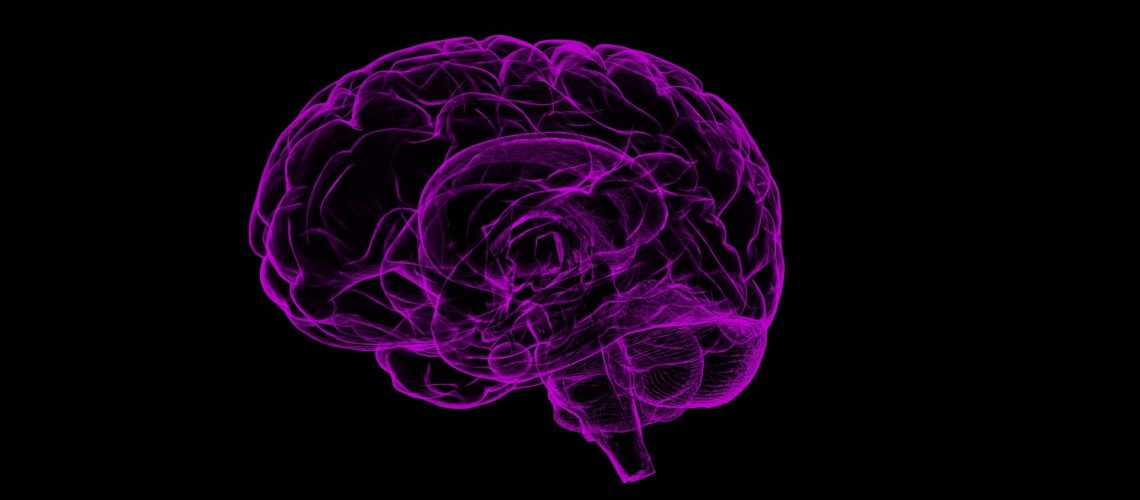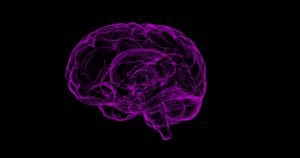Mom brain is a serious challenge for both new and seasoned moms. And we now know that dads experience it too! My kids are 4 and 7, and I still experience mom brain. Yesterday, for example, I was getting in the car to go to work, and I looked down to find a roll of toilet paper in my hands. I had picked up the roll from the bathroom countertop and, for no reason at all, carried it around the house for at least 20 minutes. I realized I had it when I sat down in my car! This is one of many examples of weird brain lapses I’ve had since I became a mom, and it was way worse during the first year or two postpartum.
If you’ve had similar brain lapses since you’ve had kids, you’re definitely not alone. Studies show that up to 81% of women who have been pregnant experience things like memory problems, confusion, disorientation, and absentmindedness. And we now know that dads experience those symptoms too, after the baby is born. Most people tend to attribute these issues to the lack of sleep they’re experiencing during those first months. That could play a role, but there are actually physical changes that happen in your brain, and your baby is the one that orchestrates them!
Mom brain starts when you get pregnant
The very roots of mom brain start growing the minute your baby implants in your uterus. Science says that it’s memory that goes first; the ability to recall facts declines starting in the first and second trimesters. Other mental functions, like paying attention, problem-solving, and planning start getting worse in the third trimester.
Why does this happen? Well, it may be partially because by the time your baby is full-term, your brain has decreased significantly in size! During pregnancy, the overall size of your brain decreases. A study using MRI (like the one shown below) showed that in particular, the amount of gray matter, which is important in complex thought, declines.

So, basically, when you feel like you’ve lost your brain during those last weeks of pregnancy, you actually have!
How can this happen?
Well, we haven’t even gotten to the craziest part of all of this yet. Here it is: your baby basically spent most of gestation programming your body and your brain. A growing embryo is basically a foreign invader, a parasite. For 9 months, it latches onto you and takes your energy reserves so that it can grow. This is great for mom’s interest in nurturing her growing child, but not so great for her own survival.
What this means is that there is a constant conflict between the growing embryo/fetus’s need to survive and grow, and your own well-being. To survive, that growing embryo needs to “convince” your body not only to allow it to be there without attacking it, but also to give it food.
To do that, it changes how your brain and your entire body work.
Here are some of the ways that may happen:
Effect 1: The embryo takes control of your immune response
Normally, if something that does not have the same genetic makeup, blood type, etc. invaded your body, your body would mount an immune response and kill it. Thankfully, not so with your growing embryo. In fact, the embryo actually hijacks your immune system to help it to survive!
When an egg is fertilized, it needs to implant into your uterine lining. When that fertilized egg (now called a blastocyst) starts to implant, it recruits some of your immune cells to the site. Those immune cells trigger inflammation at the site and help the growing blastocyst to invade.
At the same time, a special type of immune cells in your body, regulatory T-cells, go to the site too. These cells actually stop your body from attacking the growing blastocyst. So your own immune system is simultaneously helping the blastocyst to invade, and protecting it from the response that would normally protect you!
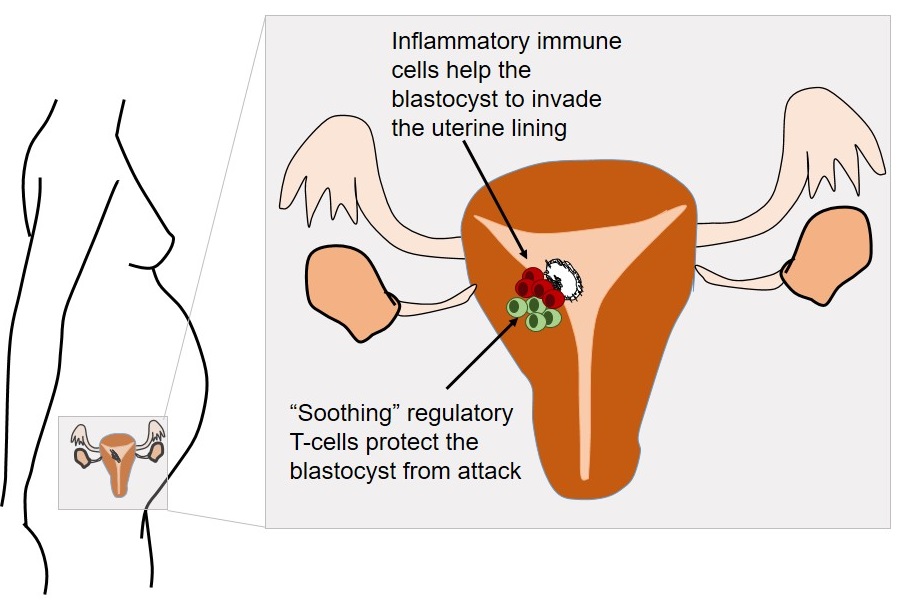
But what does all this have to do with mom brain?
Glad you asked! Those immunological changes at the site of where the placenta is forming along with hormonal changes that you experience throughout pregnancy alter the way your immune system functions in your whole body, including your brain.
Your brain is chock full of immune cells called microglia. These cells are critical for maintaining brain structure and function. When you suppress the immune system to allow that embryo to survive, not only are you more likely to catch a bug or two during pregnancy, but you decrease the number of microglia in the brain, and this can decrease the growth of new brain cells. This may be one reason that you experience those memory and attention issues.
But that’s not all…
Effect 2: The embryo takes control of your stress response
Normally, our systems are very good at responding to stress. When something is stressful, our bodies produce a hormone called cortisol. Well, embryos hijack this too.
Responses to stressful stimuli decrease during the third trimester and after the baby is born. This makes you more likely to be maternal and less likely to be anxious, which is good for raising a baby. This isn’t so good if you have to react quickly to something dangerous or stressful!
Effect 3: Embryonic cells invade your brain
This sounds a bit like Invasion of the Body Snatchers, right? Aliens take over your brain and leave behind emotionless shells. Except in the case of moms, it’s super emotional shells that get left behind.
A developing baby is basically a big mass of cells that are dividing very rapidly. Meanwhile, there are blood vessels that carry nutrients to the placenta to keep the baby growing. Because those blood vessels are there, cells from the baby can actually break off and pass into the circulation. They then travel to many parts of your body, including your brain.
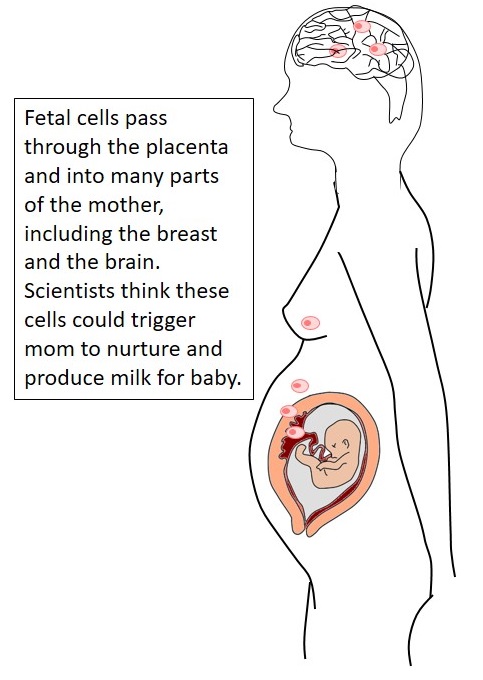
This is called microchimerism. and we know this happens, because scientists found male DNA in many different parts of moms who had male babies. Normally you would never find male DNA in any of your cells, so the only possible source was that developing embryo.
Scientists don’t know exactly what those embryonic cells do in a mom’s brain. But they think that because those cells are foreign cells, the brain may mount an immune response against them that could ultimately harm the brain tissue itself. This could cause the cognitive issues that pregnant moms experience. Not only that, but embryonic cells were found in one mom decades after her baby was born. So these cells may be there to stay for the long haul.
On the plus side, they appear to protect moms against infections and breast cancer later on.
Ok, so those may be some reasons that we “lose our brains” when when we’re pregnant. But…
Why is mom brain still here after the baby is born?
Studies do show that the gray matter in our brains starts to increase in size after your baby is born, but we still experience the symptoms of memory loss and confusion. That’s because some of the brain changes can last at least 2 years after birth. Not only that, our babies can still influence us, even though they are no longer inside of us.
When a baby is born, mom is flooded with two major hormones: prolactin and oxytocin:
Prolactin is the parental care hormone – it makes you want to hug and feed that baby til the cows come home, even through many many nights without sleep.
Oxytocin is the “love” hormone. It’s the reason you think that baby is the most beautiful wonderful thing that was ever created.
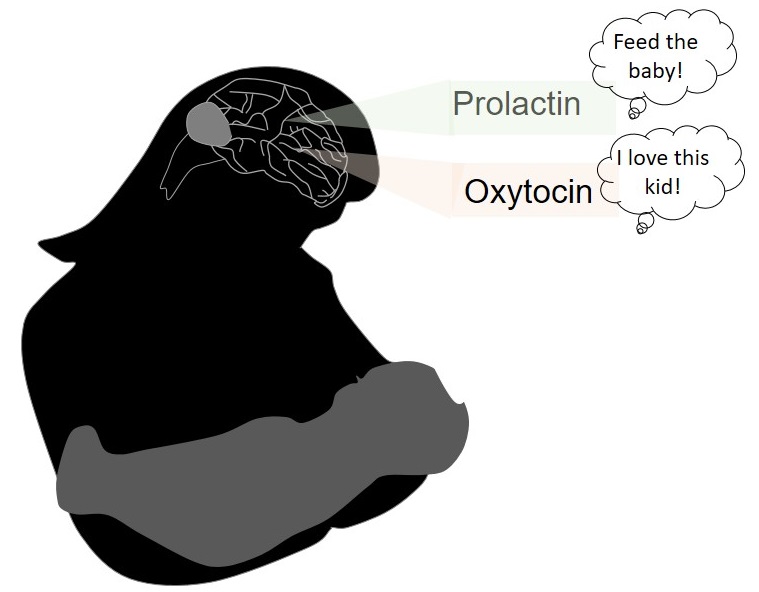
The problem is, both of these hormones have well-documented influences on memory and cognition. They can actually change the structure and function of your brain! Basically, they make you forget everything around you except for that baby. Scientists think that these hormones may do this so that you forget about the negative aspects of childbirth and those sleepless crazy days after. After all, if we really remembered some of those details, we may never have any more kids!
Guess what! This affects Dads too!
Yes, I’m finally talking about Dads. Compared to all the research done on moms, the effects of a new baby on dads have been relatively ignored. That’s changing though! New studies show that babies can also change dad brains.
When a baby is born, Dad’s testosterone levels decline dramatically, and the same two hormones I described above, prolactin and oxytocin, flood his brain. Studies show that oxytocin impairs memory in men, much like it does in women.
And here’s a bit of trivia for you. Evolutionarily speaking, babies have large heads, chubby cheeks, and big round eyes because those features trigger oxytocin in our brains.

Suddenly, we forget everyone around us, we feel lots of love, and we want to do nothing else but take care of our babies.
So what does this mean for our poor mom and dad brains?
Well, you’ve now experienced physical changes in your brains. There are other posts that give suggestions about how to deal with the memory loss and fuzziness that you experience. You can try those.
I think the bigger comfort, though, is knowing that what we’re experiencing is a part of our biology. These changes in our brain happen to help us carry our babies to term, and then stimulate us to take care of them once they are born.
